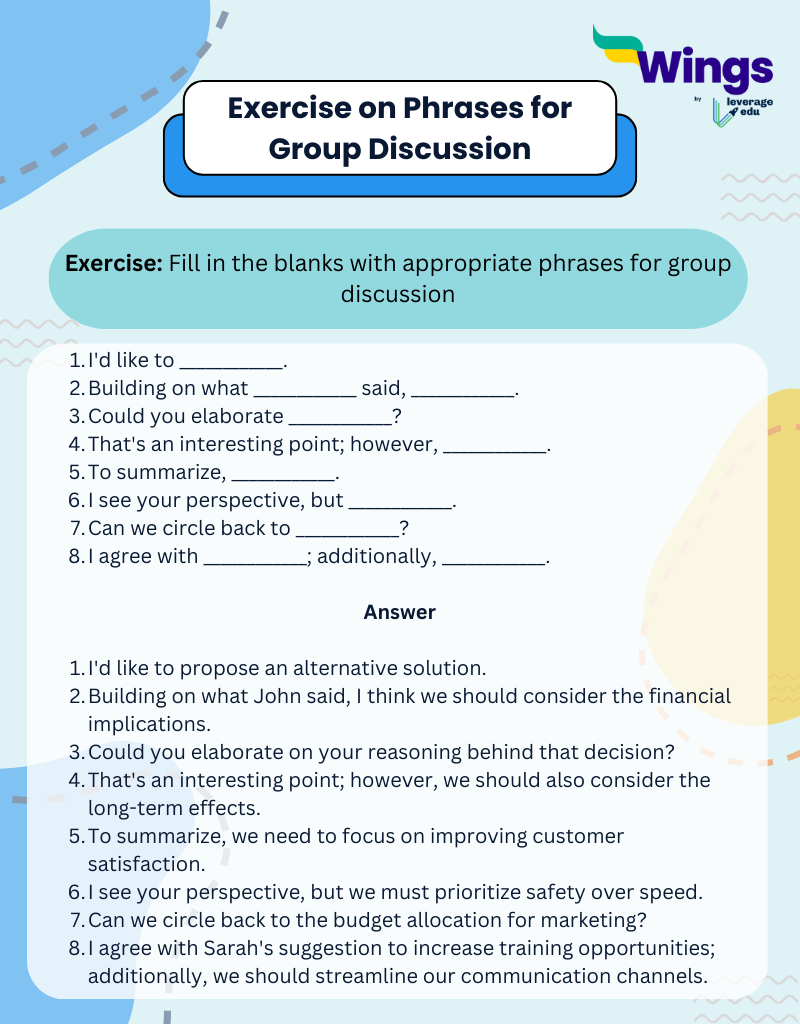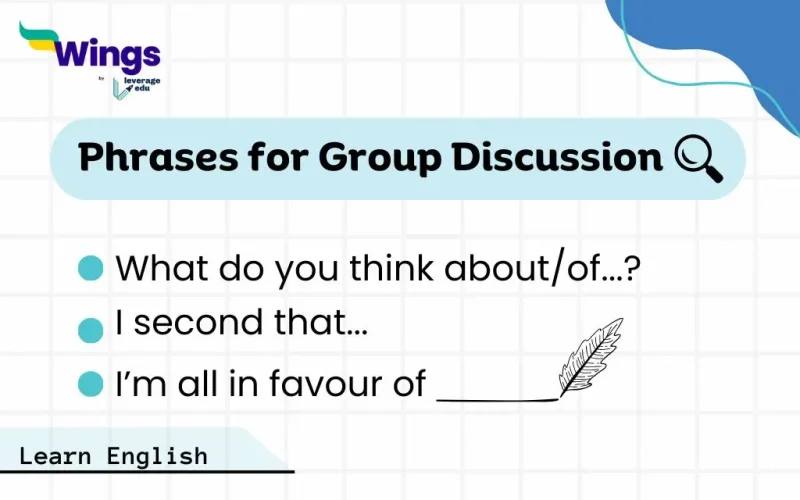Phrases for Group Discussion: Did you know, that using English phrases like ‘Could you tell me …?, I think/feel/reckon/believe …, Just tell me the reason why …?’ in any group discussion sounds more natural and has a better flow and relatability? Be it appearing in a debating competition at your school or engaging with native English speakers in discussions or client meetings as a working professional. The usage of one or two phrases now and then will improve your communication credibility on a global platform. So, without further ado, let’s explore a list of phrases for group discussion via this blog, that you can utilise not only in your academic writing but also in your professional career ahead.
This Blog Includes:
Must Read: 55+ Phrases with Meaning to Boost Your Vocabulary
Best Phrases for Group Discussion You Should Know
It is important to have an effective and meaningful conversation, whether you agree or disagree with someone else’s point of view. Thus, make sure to go through the following toolbox of phrases that you can inculcate in your daily conversation depending on the situation.
Phrases for Asking Opinion
When asking for someone’s opinion, it’s essential to be open-minded. Here are some phrases you can use to ask for an opinion.
| Could you tell me…? | What do you think about/of…? |
| What’s your opinion about…? | Do you think/feel…? |
| How do you feel about…? | May I ask you…? |
Giving Opinion
While giving your opinion, it is important to represent yourself with clarity and in a respectful way. Below are some phrases that you can refer to.
| In my opinion/view… | If you ask me… |
| As far as I can see/I’m concerned … | It seems to me that… |
| I have the/feeling that… | I think/feel/reckon/believe… |
Agreeing with an Opinion
Agreed to someone’s opinion. It’s important to acknowledge their perspective respectfully. Here are some phrases that you can look up to:
| I (quite) agree. | I agree completely/entirely |
| I couldn’t agree (with you) more. | I entirely/completely agree with you on that |
| That’s true/right | That’s just it. |
Asking for an Explanation
When further clarification is needed or understanding, asking for an explanation politely is key. Here are some expressions and phrases you can see:
| Could you explain to me …? | Could someone please tell me…? |
| Just tell me the reason why …? | I don’t really understand …? |
| I just don’t see why/what /how … | Are you saying that …? |
Giving an Explanation
When giving an explaination, it must be concise while addressing to specific points of confusion or interest. Here are some phrases that can be referred to:
| Look, it’s like this: | What I mean is … |
| The research for this is … | The main problem is … |
| Just let me explain … | Well, the reason is … |
Qualified Agreement
It allows you to agree with some aspects of an opinion or statement. Here are some phrases and expressions you can use:
| Yes, perhaps, but … | Yes, possibly, although |
| Yes, but on the other hand … | Yes, up to a point. |
| I agree up to a certain point, but … | Yes, in a way. |
Exercise on Phrases for Group Discussion

Also Reads: 60 Extempore Topics
Quick Read: Latest (GD) Group Discussion Topics
FAQs
Here are a few phrases that students can refer to: I (quite) agree, Could someone please tell me…?, Could you explain to me …?, Yes, perhaps, but …, I think/feel/reckon/believe … and more.
The three C’s which are used in group discussion are clarity, Content, and confidence.
The foremost discussion types are factual, opinion-based, case study, and abstract.
Related reads
This was all about phrases for group discussion in the English language. Hope you understand the concept and know how to proceed. You can also follow the Learn English page of Leverage Edu for more exciting and informative blogs.


 One app for all your study abroad needs
One app for all your study abroad needs












 60,000+ students trusted us with their dreams. Take the first step today!
60,000+ students trusted us with their dreams. Take the first step today!